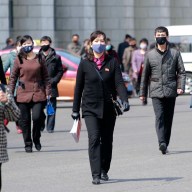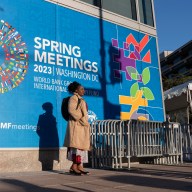The United Nations is the only impartial party that can broker peace talks in Afghanistan and negotiate a broader solution in the volatile region, according to a report from a European foundation presented to the U.N.’s chief on Tuesday.
The two pressing priorities for the international community following the Afghan elections are to transform the current international presence in the country from a heavily militarized one to a civilian one, and to shift its foreign direction to “a locally owned enterprise” led by Afghans, said the report by FRIDE, a Madrid-based think-tank that focuses on Europe’s role in the international arena.
The 205-page report, which examined peacekeeping missions authorized by the U.N. Security Council in Afghanistan and three other countries, was delivered to Secretary-General Ban Ki-moon by FRIDE’s Director General Pierre Schori, a former Swedish diplomat who served as U.N. ambassador and the U.N. special envoy in Ivory Coast.
It was written before the disputed election. Afghan officials on Tuesday released new returns that give President Hamid Karzai 54 per cent of the vote with nearly all ballots tallied, enough to avoid a run-off unless large numbers of tainted ballots are ultimately thrown out. A U.N.-backed commission, meanwhile, found “convincing evidence” of fraud in the election and ordered a recount of suspect ballots in at least three provinces – a process that could take months.
Following the Sept. 11, 2001, terrorist attacks in the United States, the Security Council approved three streams of resolutions – imposing sanctions against the Taliban and al-Qaida, authorizing the deployment of a multinational force currently led by NATO, and establishing a U.N. political and peacebuilding mission in Afghanistan known as UNAMA.
“The underlying challenge in Afghanistan was the uncomfortable co-existence of UNAMA’s state-building and political mandate with the onging war waged by the international military in parts of the country to defeat the insurgency, first in the context of the ‘war on terror’ and later as a counter-insurgency operation against the revived Taliban,” the report said.
It concluded that “the short-term goal of counter-insurgency through war fighting has undermined long-term state building and peacekeeping objectives,” and it said “the greater the number of U.S. and NATO troops arriving in Afghanistan (the) larger the resentment, resistance and violence” in the country, especially among civilians.
Currently, more troops and a new strategy for using them are emerging as critical components in the eight-year-old effort by U.S. and NATO forces to defeat the Taliban and secure Afghanistan. NATO officials said Gen. Stanley McChrystal, the top commander in Afghanistan, is expected to ask for more troops in the coming weeks.
While the report acknowledged an expected “surge in funds and manpower,” it called for new U.N. leverage “to play the kind of role that may set Afghanistan on a path of recovery.”
“In the final analysis, the role of the United Nations is crucial to bringing stability to a very volatile region,” the report said. “Only the U.N. as an inter-and trans-governmental body … can be perceived as an impartial actor that can act as a legitimate third party that can broker negotiations within Afghanistan and negotiate a political strategy for the region.”
It said UNAMA, “a limited mission with an ambitious mandate,” can’t tackle that job.
The report called on the Security Council to encourage the U.N. “to play a more strategic role” by establishing contact groups and appointing a high-level envoy to engage in shuttle diplomacy “and strategic interventions.”











